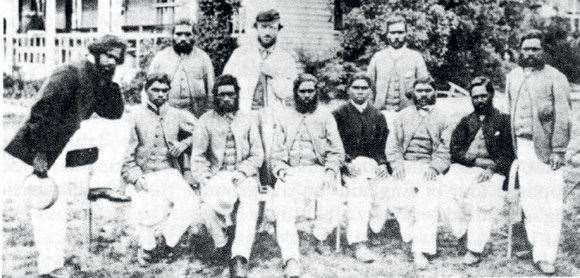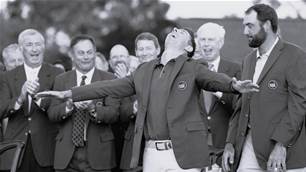A Fine Cricketer and Footballer, and the first man to write up a set of rules for our indigenous code of Football: Tom Willis is a colourful, tragic giant of Australian Sport.
A Fine Cricketer and Footballer, and the first man to write up a set of rules for our indigenous code of Football: Tom Willis is a colourful, tragic giant of Australian Sport.
 Wills with his Aboriginal team of 1866-7.
Wills with his Aboriginal team of 1866-7.Image: Getty Images
The place of Tom Wills in Australia’s folklore should be as prominent as Bradman’s, Phar Lap’s or Darcy’s, but his role in our sporting history has been “de-emphasised”, first by the Melbourne Cricket Club, who deprecated his “unwholesome” character, and then more recently by debate as to whether the ancient Aboriginal game, Marn Grook, is Australian rules’ precursor.
Without Tom Wills, the connection between the ancient, totemic game based on kicking a possum skin or typha-root “ball” (and characterised by high leaping, spectacular catching and long kicking) and Australian Rules football might never have been created. There’s virtually no other plausible link to the ancient game.This nexus has been called a “seductive myth” and discredited by some historians. Nevertheless, Wills’ role is indisputable, and there’s no denying that Australian rules, the game Wills played such an important part in inventing, lends itself to the talents of Indigenous people and has played a major part in inviting them into mainstream Australian sport.
Certainly, the structure and dynamic of Marn Grook, so different from other games played in the colonies at the time, seems to have informed Wills’ vision for the game he proposed in 1858. Although the spectacular mark didn’t become a feature of Australian rules until the 1880s, the game always allowed for the possibility.Wills was brought up in western Victoria and spent his younger days playing with children of the local Aboriginal people, the Tjapwarrung. His familiarity with their customs and language meant he had exposure to Marn Grook, a game played by the Tjapwarrung that also served as a ritual.
At 14, in 1850, Wills was sent to England’s Rugby school. His approach to his sport was influenced by the Indigenous people he associated with. He was an attacking, elusive rugby player and a prodigious kick of a ball. Going on to Cambridge, he was part of their first XI, and, as an accomplished all-rounder, was considered one of the best prospects in England. His sporting achievements continued upon his return to Australia. He represented Victoria in inter-colony cricket matches and became secretary of the MCC in 1857, despite this establishment bastion’s objection to his convict heritage. Wills’ forceful personality and powerful, physical presence made him a convincing character, often against the odds.
Related Articles

Feature Story: Moving the Needle

The Aussies at The Open













